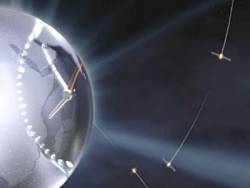
The European Space Agency (ESA) has invited proposals from the scientific community, private companies, and research organizations about ways to use signals from Galileo and the European Geostationary Navigation Overlay Service (EGNOS) in studies that provide guidance for design of Europe’s next-generation GNSS systems.
The European Space Agency (ESA) has invited proposals from the scientific community, private companies, and research organizations about ways to use signals from Galileo and the European Geostationary Navigation Overlay Service (EGNOS) in studies that provide guidance for design of Europe’s next-generation GNSS systems.
The initiative, which is part of the European GNSS Evolutions Program (EGEP), will support an estimated 10–15 projects with a typical value between €70,000 and €150,000 — not to exceed €200,000. Only bidders from one of the 18 nations participating in the optional EGEP will be eligible to have their proposals funded.
Deadline for submitting an initial “outline proposal” is May 25. Based on those outlines, ESA will perform a pre-selection of bidders that will then be invited to prepare a complete proposal in reply to a request for quotation (RFQ) to be issued by the Agency at that time. This RFQ will include the draft contract conditions.
Key goals of the GNSS science research opportunity are:
· to raise the awareness of the features of the European satellite navigation systems in the scientific community
· to elaborate concepts and/or design experiments that can improve scientific insights by making use of the European satnav systems
· To provide feedback from the scientific community using GNSS signals to the European GNSS Evolutions Program.
The proposals should therefore demonstrate that they are addressing significant scientific issues by exploiting EGNOS or Galileo, including but not limited to earth and planetary sciences, metrology, and fundamental physics (such as GNSS and relativity).
Proposals must be submitted electronically on the dedicated Internet server, <http://egep.esa.int>. More information and detailed guidelines for submitting proposals may be found online at <http://egep.esa.int/egep/web/public/home>.




